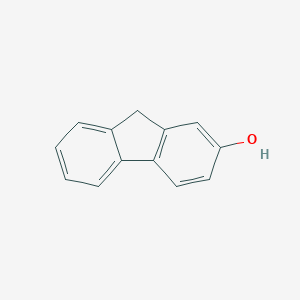-
Categories
-
Pharmaceutical Intermediates
-
Active Pharmaceutical Ingredients
-
Food Additives
- Industrial Coatings
- Agrochemicals
- Dyes and Pigments
- Surfactant
- Flavors and Fragrances
- Chemical Reagents
- Catalyst and Auxiliary
- Natural Products
- Inorganic Chemistry
-
Organic Chemistry
-
Biochemical Engineering
- Analytical Chemistry
- Cosmetic Ingredient
-
Pharmaceutical Intermediates
Promotion
ECHEMI Mall
Wholesale
Weekly Price
Exhibition
News
-
Trade Service
On November 16, Apellis announced that the FDA had accepted the application for the listing of pegcetacoplan's treatment of pyroglobinuria (PNH) and granted priority review eligibility.
PDUFA is scheduled to be approved on May 14, 2021.
NDA application is based on a head-to-head Phase III clinical study code-named PEGASUS.
study reached the primary therapeutic endpoint: there was a statistically significant difference between the improvement of hemoglobin levels compared to the baseline in the 16th week of pegcetacoplan therapy compared to the control group.
data also showed a higher rate of normalization of hemolytic symptoms in the pegcetacoplan group, and a clinically significant improvement in the chronic disease treatment function assessment (FACIT)-fatigue score.
the security of pegcetacoplan is comparable to that of Ikuju single resistance.
Pegcetacoplan is a targeted supplement C3 therapy designed to regulate the overactivation of complement cascades, which are part of the body's immune system and can lead to the occurrence and progression of a variety of serious diseases.
Pegcetacoplan is a synthetic cyclopeptide, coupled with polyglycol polymers, specific to C3 and C3b.
Pegcetacoplan structure Pegcetacoplan is currently developing adaptations and progress (Source: NextPharma) Ikuzhu monoantitor, a recombinant humanized monoclonal antibody developed by Alexion for complement C5, was first approved for market in 2007 and has now been approved for four species Rare disease adaptation: PNH, atypical hemolytic uremia syndrome (aHUS), anti-AchR antibody-positive systemic severe muscle weakness (gMG), anti-water channel protein-4 (AQP4) antibody-positive visual neuroscolitis spectrum disorder (NMOSD).
was approved by the NMPA on September 4, 2018 for the treatment of PNH and atypical dissolved aHUS in adults and children.
is also one of the world's best-selling orphan drugs, with sales of $3,946 million in 2019.
hemoglobinuria (PNH) is an after-the-day hemolytic disease.
the disease stems from a mutation in the pig-A gene in hematopoietic stem cells that causes a group of membrane proteins that are anchored to the cell surface by glycosylphosphatidylinositol (GPI) to cause changes in cell performance.
abnormal cells lack GPI-connected proteins, which makes them sensitive to complements, and thus causes corresponding clinical phenomena.
blood hemolysis, potential hemagnetic failure and thrombosis were the three main clinical manifestations.
PNH incidence rate in Western countries (1 to 2)/1 million population/year, the marked population is 1.3/1 million population/year.
PNH registration study of nine centers nationwide, which began in 2011, had registered 700 patients as of May 2016.
PNH incidence rate has not been very accurate statistics, but in general, the North than the South is more common, the overall incidence should be similar to agenitional anemia (re-impairment, AA), in about 1/100,000, more common in Europe and the United States.
age of morbidity has been reported in all age groups, from 2 to 80 years of age, but both at home and abroad are the majority of young adults, 20 to 40 years old about 77%.
men and women can become ill.
Beijing Concord Hospital reported that The proportion of women in China and other Asian countries is similar, significantly lower than in Europe and the United States.
ratio of men to women in 651 cases reported in 14 different regions of the country was 2.4:1.
Saiderico Grossi, chief medical officer at Apellis, said that for more than a decade, C5 inhibitors were the only option for treating PNH, and many patients continued to suffer from persistent hymoglobin problems, often suffering from debilitating fatigue and frequent blood transfusions.
FDA-granted priority review eligibility brings pegcetacoplan one step closer to patients in need.
data demonstrate the therapeutic potential of targeted complement C3, and we will continue to advance multiple registered studies of this target for serious diseases with little or no treatment.







